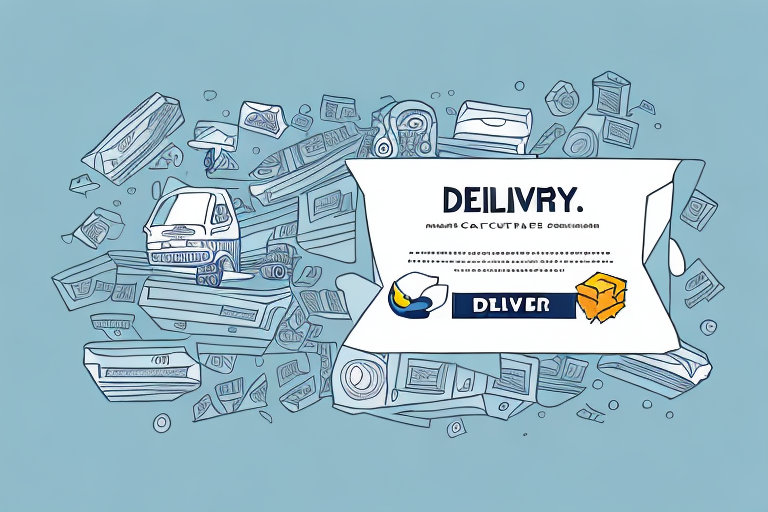The Basics of Courier Services: An Overview
Courier services are companies that provide a fast and secure method to transport goods from one location to another. These services are typically utilized by businesses that need to transport documents or products on a regular basis. According to Statista, the global courier services market was valued at over $400 billion in 2023, highlighting their essential role in the modern economy.
Courier services offer a range of delivery options, including:
- Express Delivery: Guaranteed delivery within a specific time frame, often within the same day.
- Same-Day Delivery: Delivery on the same calendar day the order is placed.
- Overnight Delivery: Delivery by the next business day.
Additionally, many courier services provide tracking and insurance options to ensure the safe and timely delivery of your goods.
One significant advantage of using courier services is the ability to customize delivery options. This flexibility is particularly beneficial for time-sensitive or confidential documents. Moreover, international delivery options are available, making it easier for businesses to transport goods across borders efficiently.
Courier companies often utilize specialized equipment and vehicles to handle fragile or oversized items. Examples include temperature-controlled vehicles for perishable goods and specialized packaging for delicate items like artwork or medical equipment. Overall, courier services offer a reliable and efficient solution for transporting goods, tailored to meet varied business needs.
How Courier Fees are Calculated: Key Factors
The cost of courier services is influenced by several factors, including:
- Distance: Longer distances typically incur higher fees. For instance, shipping domestically within the United States may cost less compared to international shipments.
- Size and Weight: Larger and heavier shipments require more resources for transportation and handling, leading to increased costs.
- Delivery Time: Express or same-day delivery services are more expensive than standard or overnight options.
- Service Level: Enhanced services such as special handling or priority logistics can raise the overall cost.
- Insurance Value: Higher-value shipments necessitate more comprehensive insurance coverage, thereby increasing fees.
- Type of Goods: Hazardous or fragile items may require special handling and packaging, which can add to the cost.
Understanding these factors is crucial for businesses to optimize their shipping costs and select the most appropriate courier service for their needs.
Types of Courier Fees You May Encounter
When utilizing courier services, various fees may apply. Common types include:
- Pickup and Delivery Fees: Charged for collecting and delivering goods to and from designated locations.
- Fuel Surcharges: Applied to compensate for fluctuating fuel prices, typically calculated as a percentage of the total cost.
- Insurance Fees: Cover the value of the goods being shipped. For example, shipping high-value electronics may require additional insurance.
- Residential Fees: Extra charges for delivering to residential addresses instead of commercial locations.
- Special Handling Fees: Levied for items that require special care, such as hazardous materials or fragile items.
- Expedited Delivery Fees: Applied when faster delivery is needed beyond standard timeframes.
- Package Tracking Fees: Offered for real-time tracking services, allowing customers to monitor the status and location of their shipments.
Being aware of these fees helps businesses to accurately budget for their shipping needs and avoid unexpected costs.
Negotiating Courier Fees: Tips and Strategies
Negotiating courier fees can lead to significant cost savings. Here are some effective strategies:
- Gather Multiple Quotes: Obtain price quotes from several courier providers to understand the market rates and leverage better deals.
- Define Clear Requirements: Clearly outline your shipping needs, including volume, frequency, and special handling requirements, to negotiate appropriate pricing.
- Consider Long-Term Contracts: Commit to a long-term partnership with a courier service in exchange for discounted rates.
- Leverage Volume Discounts: Shipping larger volumes can qualify for reduced rates. Discuss tiered pricing options with providers.
- Evaluate Service Levels: Assess the necessity of premium services. Opting for standard delivery when possible can lower costs.
Building a strong relationship with your courier provider can also lead to more favorable terms and added benefits over time.
Hidden Costs in Courier Fees: What to Watch Out For
When managing courier fees, it's essential to be aware of potential hidden costs that may not be immediately apparent:
- Customs Fees and Duties: Applicable to international shipments, these fees vary based on the destination country's regulations and the value of the goods.
- Taxes: Additional taxes may be imposed on certain shipments, depending on the jurisdiction.
- Clearance Charges: Fees for processing shipments through customs or other regulatory bodies.
- Storage Fees: Incurred if shipments are delayed or require temporary storage at the courier's facility.
To avoid unexpected expenses, always clarify with your courier provider about any additional charges that may apply, especially for international deliveries.
How to Choose the Right Courier Service for Your Needs
Selecting the appropriate courier service involves evaluating several key factors:
- Service Level: Determine whether you need standard, expedited, or specialized delivery services based on your shipment's urgency and nature.
- Reputation and Reliability: Research customer reviews and industry ratings to assess the courier’s reliability and customer satisfaction.
- Pricing Structure: Compare rates, considering both base fees and additional charges, to ensure competitive pricing.
- Delivery Times: Ensure the courier can meet your required delivery timelines.
- Tracking Capabilities: Opt for services that offer real-time tracking to monitor your shipments effectively.
- Coverage Area: Verify that the courier operates in your required regions, both domestically and internationally.
- Customer Support: Choose a provider with responsive and helpful customer service to address any issues promptly.
By thoroughly researching and comparing different providers, businesses can select a courier service that best aligns with their operational needs and budget constraints.
Comparing Courier Fees Across Different Providers
When evaluating courier fee structures, it's crucial to ensure a fair comparison by considering the following:
- Comprehensive Quotes: Request detailed quotes that include all possible fees, such as pickup and delivery, fuel surcharges, insurance, and taxes.
- Delivery Speed: Compare the delivery timelines offered by each provider to match your shipment’s urgency.
- Service Features: Assess additional services like tracking, insurance coverage, and customer support.
- Reputation and Reliability: Factor in customer reviews and industry ratings to gauge the quality of service.
For example, while Company A may offer lower base rates, Company B might provide more reliable delivery times and better customer support, offering overall greater value.
Utilizing comparison tools and platforms can aid in systematically evaluating different courier options to make an informed decision.
Common Mistakes to Avoid When Dealing with Courier Fees
Avoiding common pitfalls can lead to significant savings and smoother shipping operations:
- Not Understanding Terms and Conditions: Always read and comprehend the service agreement to be aware of all fees, surcharges, and liability clauses.
- Underestimating Shipment Size or Weight: Accurately measure and weigh your shipments to avoid unexpected fees due to misclassification.
- Neglecting to Compare Providers: Failing to evaluate multiple courier services can result in paying higher fees than necessary.
- Poor Packaging: Inadequate packaging can lead to damage, incurring additional handling or replacement costs.
- Ignoring Additional Services: Overlooking the benefits of services like tracking and insurance can compromise shipment security and oversight.
By being mindful of these common mistakes, businesses can enhance their shipping efficiency and reduce unnecessary costs.
Understanding International Courier Fees and Customs Charges
International shipments come with additional costs that must be carefully managed:
- Customs Fees and Duties: These vary based on the destination country’s regulations, the type of goods, and their declared value. For example, DHL provides detailed customs guidelines to help navigate these charges.
- Taxes: Some countries impose import taxes on certain goods, which can affect the overall cost of shipping.
- Documentation Fees: Required paperwork for customs clearance can incur additional charges.
- Prohibited and Restricted Items: Shipping certain items may require special permits or may be entirely prohibited, leading to potential fines or shipment returns.
To minimize delays and additional costs, it's essential to:
- Research the import regulations of the destination country.
- Ensure all necessary documentation is accurately completed and included with the shipment.
- Consult with the courier provider regarding any specific requirements or restrictions.
How Technology is Changing the Courier Industry and Its Fees
Advancements in technology are transforming the courier industry, leading to increased efficiency and evolving fee structures:
- Drones and Autonomous Vehicles: Companies like Amazon Prime Air are pioneering the use of drones for last-mile deliveries, which can lower labor costs and improve delivery speeds.
- Real-Time Tracking Systems: Enhanced GPS and IoT technologies allow for precise tracking of shipments, improving transparency and customer satisfaction.
- Artificial Intelligence and Machine Learning: These technologies optimize routing and logistics, reducing fuel consumption and operational costs.
- Automation in Warehousing: Automated sorting and handling systems streamline operations, reducing the need for manual intervention and associated costs.
These technological innovations not only enhance the efficiency of courier services but also influence pricing strategies. As automation reduces operational costs, courier providers may offer more competitive rates while maintaining high service standards.
Furthermore, the integration of technology allows for more personalized and flexible delivery options, such as dynamic routing based on real-time traffic data or customer preferences, enhancing the overall customer experience.
The Future of Courier Services and What It Means for Pricing
The future of courier services is poised to embrace further technological advancements and evolving consumer demands:
- Increased Automation: Continued adoption of robotics and AI will streamline operations, potentially lowering costs and allowing for more competitive pricing.
- Green Logistics: Growing emphasis on sustainability may lead to investments in eco-friendly vehicles and carbon offset programs, which could influence pricing structures.
- Customized Delivery Solutions: Enhanced data analytics will enable more tailored delivery options, catering to specific customer needs and potentially creating tiered pricing models.
- Integration with E-commerce Platforms: Seamless integration with online retailers will improve logistics efficiency and offer bundled services, affecting overall pricing dynamics.
As the courier industry becomes more competitive and technology-driven, businesses can expect to see more flexible and cost-effective pricing strategies that cater to diverse shipping requirements. Staying informed about these trends will help businesses adapt their logistics strategies to optimize costs and service quality.
Overall, understanding the factors that influence courier fees and staying abreast of industry developments can empower businesses to make informed decisions, ensuring efficient and cost-effective transportation of goods.




















